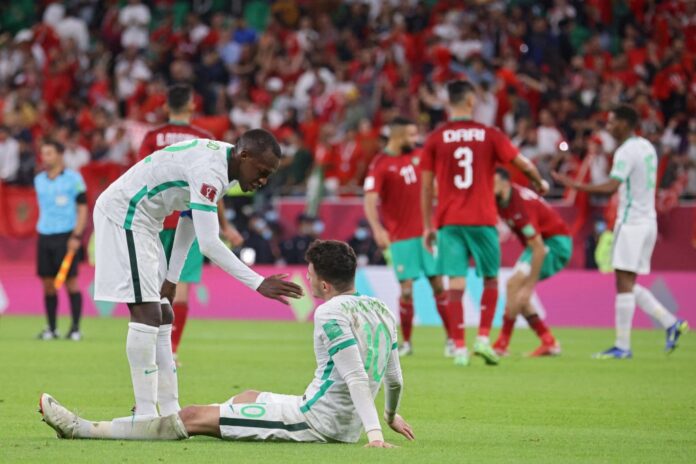When the 2021 Arab Cup quarterfinals took place over the weekend, Saudi Arabia and Iraq, two of Asia’s traditional powerhouses, were nowhere to be seen.
Despite being two of the region’s most successful teams, they both exited at the group stage after a series of disappointing performances.
There has been huge discontent among Iraqis with the way the team has been managed and the technical instability since their frustrating performances in the World Cup qualifiers. It is no surprise that Iraq will be scrutinized for their performances at the Arab Cup, especially since they arrived in Qatar looking to claim a fifth title, but left the group stage with two draws with Oman and Bahrain and a heavy loss to the hosts.
Saudi Arabia, meanwhile, ended with a draw and two defeats, scoring only one goal and failing to keep a clean sheet in the three matches.
The two-time winners’ appearance in this tournament did not match their recent outstanding results or elegant performances in the qualifying rounds for the 2022 World Cup.
The Saudis also — but to a lesser extent — have been criticized by some fans. But it is important to focus on the goal of their participation in their tournament. Was it to win the competition? Or did they have longer-term targets?
While making it clear that he did not wish to devalue the tournament, Green Falcons coach Herve Renard used it as a platform to try out the country’s young talent — those born in the year 1999 and after — with his assistant Laurent Bonadei taking charge of team affairs. The idea was to pick out those that could potentially go on to play at the World Cup next year or the AFC Asian Cup in 2023. This is the same approach that the Frenchman had previously taken when in charge of the Moroccan national team ahead of the African Cup of Nations.
Watching from the stands allowed Renard to supervise the young players from a distance and study their performance better, and more dispassionately, than if he had been in complete charge.
Still, Renard was criticized for choosing certain players randomly, without preparation, and without homogeneity or cohesion on the field. The team did not appear to be playing with a clear identity in attack.
Contrast that with the Saudi first team’s exceptional performances and personality in the World Cup qualifiers, which have produced 16 points from five victories and a draw. They sit atop their qualifying group and are strong favorites to make it to Qatar 2022.
While it would have been asking a lot to maintain that level with what was essentially a reserve team, many believe Renard left out players — such as Saleh Al-Shehri — who could have benefited from showing off their skills and character.
While disappointment, even heartbreak, was evident in the Saudi press, which stressed the team’s lack of experience, it is hoped that this tournament will eventually be seen as a strategy with a long-term benefit. I see that the participation with fringe players was a wise and smart decision, especially since the calendar is already hectic for many of the first-choice squad members.
In fact, the players are to be applauded, as their participation was far from a disgrace, given their complete lack of preparation time, and they have already confirmed the benefit they gained from the experience of playing against more mature and experienced players.
Responsibility for the results, and the team’s elimination, lies with Renard, which is something that he was more than prepared for.
It is true that the result was statistically the worst in Saudi Arabia’s history in this tournament, but the main objectives remain qualification for next year’s World Cup and the AFC Asian Cup beyond that.
Only then will we find out if the strategy applied in this Arab Cup was correct or not.

